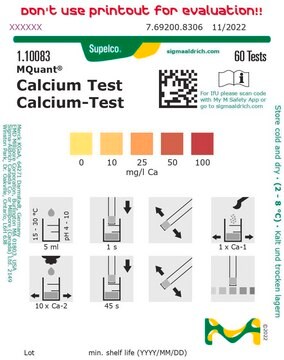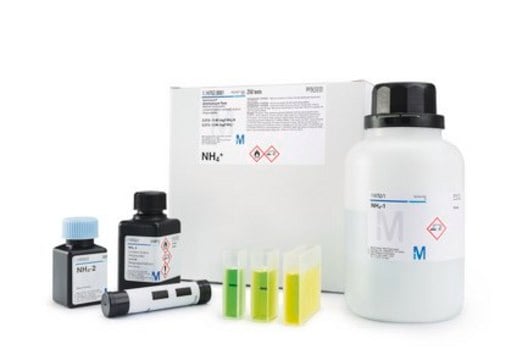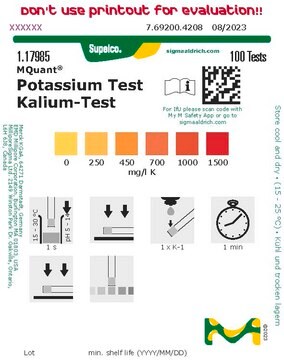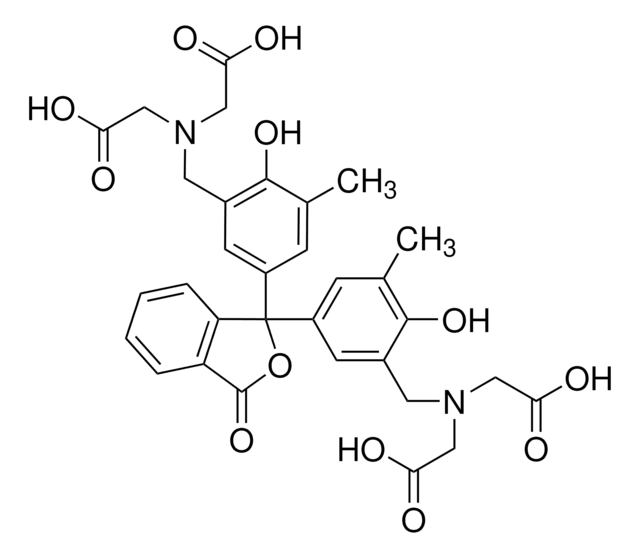MAK022
Calcium Colorimetric Assay
sufficient for 250 colorimetric tests
Sign Into View Organizational & Contract Pricing
All Photos(2)
About This Item
UNSPSC Code:
12161503
NACRES:
NA.84
Recommended Products
usage
sufficient for 250 colorimetric tests
application(s)
cosmetics
food and beverages
detection method
colorimetric
relevant disease(s)
neurological disorders; hematological disorder
storage temp.
2-8°C
General description
Calcium, the most abundant mineral in the human body, is a crucial intracellular element that is responsible for regulating many physiological and pathological processes. Calcium is found in either the free ion form or in bound complexes, for example the calcium phosphate and calcium carbonate complexes that make up bone tissue. Numerous physiological processes, including muscle contraction, cell adhesion, hormones/ neurotransmitters release, glycogen metabolism, cell proliferation/differentiation, blood clotting, nerve or synapthetic impulse transmission, and structural support of the skeleton are regulated by calcium signaling. Defects in the integrity of cell-specific calcium signaling systems may be associated with certain human diseases.
Application
Calcium Colorimetric Assay kit has been used to measure calcium concentration in hippocampal samples and MC3T3-E1 mouse osteoblast cell line, which were cultured in osteogenic induction medium.
Features and Benefits
Compatible with high-throughput handling systems.
Suitability
Suitable for use with cell and tissue culture supernatants, urine, plasma, serum, fecal material, media, and other biological fluids.
Principle
In this assay, the calcium ion concentration is determined by the chromogenic complex formed between calcium ions and o-cresolphthalein, which is measured at 575 nm and is proportional to the concentration of calcium ions present. The linear range of detection for this kit is between 0.4-2.0 μg.
replaced by
Product No.
Description
Pricing
Signal Word
Danger
Hazard Statements
Precautionary Statements
Hazard Classifications
Aquatic Chronic 3 - Eye Dam. 1 - Skin Irrit. 2
Storage Class Code
12 - Non Combustible Liquids
Flash Point(F)
Not applicable
Flash Point(C)
Not applicable
Choose from one of the most recent versions:
Certificates of Analysis (COA)
Lot/Batch Number
Don't see the Right Version?
If you require a particular version, you can look up a specific certificate by the Lot or Batch number.
Already Own This Product?
Find documentation for the products that you have recently purchased in the Document Library.
Customers Also Viewed
Creatine?facilitated protection of stress caused by disrupted circadian rhythm
George B, et al.
Biological Rhythm Research, 49(1), 61- 75 (2018)
Kathryn M Thrailkill et al.
Bone, 133, 115254-115254 (2020-01-29)
Selective sodium-dependent glucose co-transporter 2 inhibitors (SGLT2Is) are oral hypoglycemic medications utilized increasingly in the medical management of hyperglycemia among persons with type 2 diabetes (T2D). Despite favorable effects on cardiovascular events, specific SGLT2Is have been associated with an increased
Kang Liu et al.
International journal of molecular medicine, 45(6), 1793-1802 (2020-04-03)
Calbindin‑D28K (Calb1) may protect human lens epithelial cells (HLECs) from apoptosis, which is a process resulting in individual cell death. The protective effects of Calb1 may be attributed to buffering high concentrations of Ca2+. The present study investigated the mechanisms
Calcium intake, calcium homeostasis and health.
Fan P, et al.
Food science and human wellness, 5(1), 8-16 (2016)
Wei Ji et al.
Molecular medicine reports, 16(5), 7391-7397 (2017-09-26)
Ankylosing spondylitis (AS) is characterized by the formation of bony spurs. Treatment of the resulting ankylosis, excessive bone formation and associated functional impairment, remain the primary therapeutic aims in research regarding this condition. Triptolide is the primary active component of
Our team of scientists has experience in all areas of research including Life Science, Material Science, Chemical Synthesis, Chromatography, Analytical and many others.
Contact Technical Service







